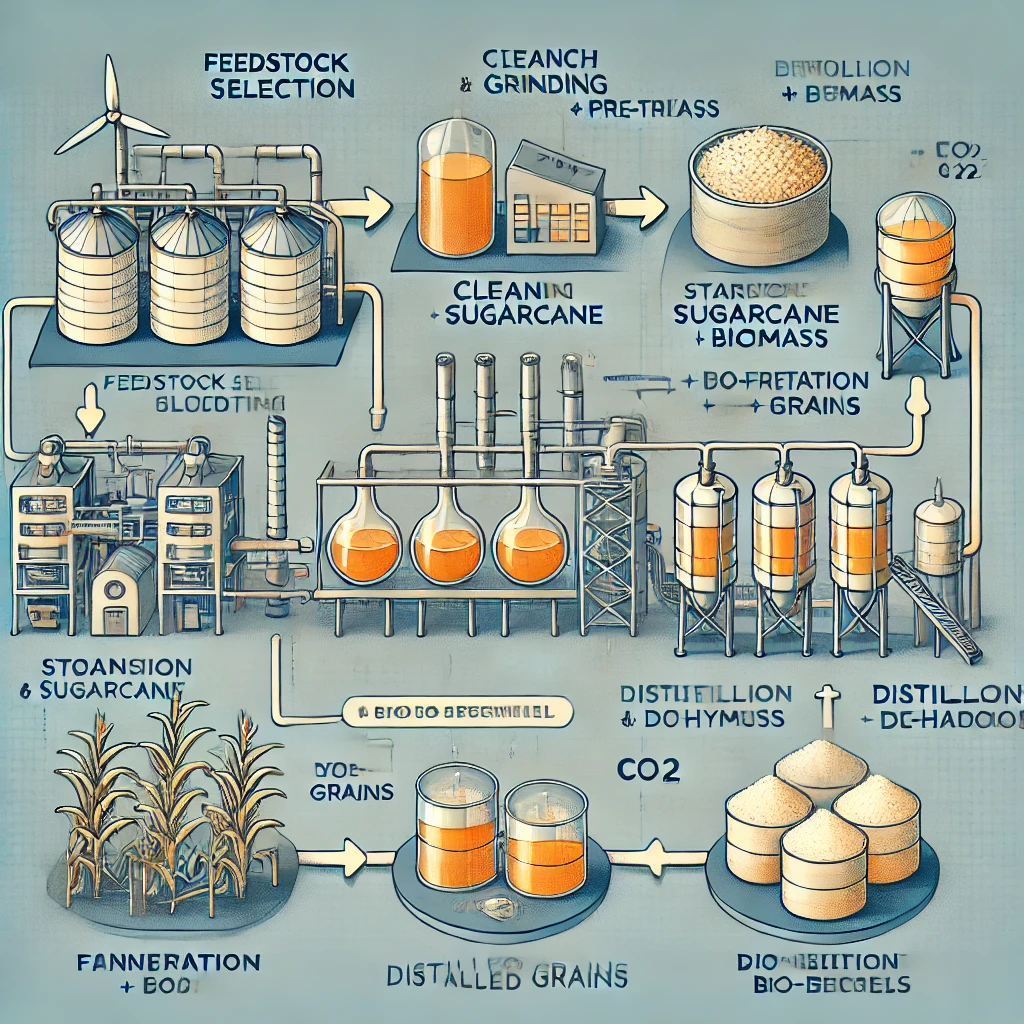Table of Contents
Introduction: India’s Green Fuel Revolution
India is moving rapidly toward cleaner energy solutions, with bio-based alternatives playing a central role. Among these, a plant-derived fuel has emerged as a game-changer in reshaping how the country approaches transport, sustainability and energy security.
What is Ethanol and Why It Matters?
Ethanol is a renewable, bio-based alcohol primarily derived from fermented crops such as sugarcane, corn, and other biomass. This colorless, flammable liquid has become a cornerstone of clean energy strategies worldwide. At EthanolNews.in, we bring you the most detailed and up-to-date information about the importance of ethanol in India’s energy transition, its economic impact, and how it plays a pivotal role in reducing greenhouse gas emissions.
Learn more about the global impact of ethanol on the U.S. Department of Energy Biofuels Basics.

India’s Ethanol Blending Program: A National Priority
India’s government has launched an ambitious Ethanol Blended Petrol (EBP) program, aiming to blend 20% ethanol with petrol by 2025. This monumental initiative is expected to:
- Reduce crude oil imports
- Save billions in foreign exchange
- Create job opportunities in rural areas
- Lower carbon emissions significantly
we cover every policy update, blending target, and progress milestone so stakeholders remain informed and engaged. The E20 Roadmap, released by the Indian government, outlines the path for automotive, fuel retail, and production sectors to align with this goal.
Access the full E20 policy framework at the NITI Aayog E20 Roadmap PDF.
Ethanol Production in India: Current Status and Expansion
India’s ethanol production capacity has seen a massive scale-up, with over 800 crore liters projected for 2025. Production is mainly from:
- Sugarcane Juice & Molasses – High yield and traditional
- Damaged Food Grains – Effective utilization of waste
- Maize & Sorghum – Promising second-generation feedstocks
- Ligno-cellulosic Biomass – Emerging third-generation ethanol
Public and private investments in ethanol plants are on the rise, backed by schemes like Interest Subvention for Expansion of Distilleries, Viability Gap Funding, and other Make in India incentives.
Ethanol vs. Petrol: Comparative Environmental Benefits
Ethanol-blended fuel burns cleaner than pure petrol, leading to substantial environmental benefits:
- Up to 40% reduction in CO2 emissions
- Minimal particulate matter output
- No sulfur dioxide emissions
- Lower ozone pollution
We believe that ethanol is not just an alternative fuel. it’s a climate action solution. Our in-depth analyses prove how adopting ethanol can help India meet its Paris Agreement targets.
Economic Impact of Ethanol in India
The ethanol economy is reshaping India’s rural financial landscape:
- Farmers benefit from assured crop offtake
- Sugar mills see diversified income streams
- New distilleries generate employment in semi-urban areas
- Logistics and supply chains witness robust expansion
India is seeing a biofuel revolution that supports both economic growth and energy independence.
Technological Innovations in Ethanol Production
Cutting-edge technologies are now transforming ethanol production:
- Second-generation (2G) ethanol plants convert non-food biomass like agricultural waste into fuel
- Advanced fermentation techniques improve efficiency and reduce time
- Carbon capture technologies are being integrated to lower process emissions
We bring readers updates on every major ethanol plant inauguration, pilot project, and R&D milestone across India.
Challenges in Ethanol Adoption and How to Overcome Them
While ethanol has great promise, it faces hurdles:
- Feedstock availability fluctuations
- Water usage in production
- Transport and storage infrastructure gaps
- Lack of awareness among consumers
At EthanolNews.in, we not only report on these challenges but also offer policy recommendations, expert interviews, and real-time progress on how stakeholders are addressing these issues.
Role of Ethanol in Indian Automotive Sector
With E20-compatible engines becoming standard, ethanol is transforming Indian transport:
- Hero MotoCorp, TVS, and Maruti Suzuki are already developing flex-fuel vehicles
- Bharat Stage VI norms align with ethanol-based fuel systems
- OEMs are innovating to ensure vehicles are compatible up to E85 levels
This makes ethanol a strategic fuel that boosts India’s automobile and manufacturing sectors.
Government Incentives and Policies Supporting Ethanol
Ethanol production is encouraged through favorable government policies:
- Minimum Support Prices (MSPs) for ethanol from various feedstocks
- Excise duty waivers on blended fuel
- Ethanol Interest Subvention Scheme
- Priority land allocations for biofuel units
We track every government announcement and provide expert commentary on its implications for the sector.
Global Ethanol Trends: India’s Place in the World
India is joining the ranks of top global ethanol producers such as:
- United States
- Brazil
- China
We provide global market insights, price trends, import-export statistics, and India’s potential as a biofuel hub in South Asia.
Ethanol as a Catalyst for Atmanirbhar Bharat
By investing in ethanol infrastructure, India can reduce its dependency on foreign oil, increase farmers’ income, and build a self-reliant energy ecosystem. At EthanolNews.in, we believe ethanol is not just fuel—it’s a national mission.
Keyword Optimization: biofuel ।। E20 blending renewable fuel ।। flex-fuel ।। green energy ।। sugarcane ethanol ।। ethanol production in India ।। ethanol policy ।।
For the latest ethanol industry updates, visit: ethanolnews.in
Read More:




